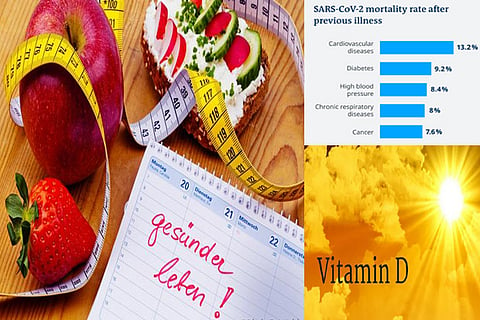

Chennai
This is reason enough for many researchers around the world to investigate whether individual micronutrients used in a targeted manner can make a COVID-19 infection less severe and thus prevent serious consequences or even death from the disease. Vitamin D is one of the most popular subjects of research. And some of the published studies sound quite promising, such as the work of the Spanish pneumologist Marta Castillo.
“This is one of the studies that is repeatedly cited as proving the effectiveness of vitamin D,” says Martin Smollich, a pharmacologist and professor at the Institute of Nutritional Medicine at the University Medical Center Schleswig-Holstein in the northern German city of Lubeck. Smollich himself conducts research on micronutrients and dietary supplements. At a time when the influence of vitamins and Co. is either greatly exaggerated for ideological and business reasons or dismissed with contemptuous derision, Smollich is trying to put together a more differentiated picture.
Seeming evidence
At first glance, the results of Castillo’s study seem to give cause for optimism: Of the 50 COVID-19 patients who were given vitamin D, only one landed on the intensive care unit, while in the control group, where no vitamin D was administered, 50% needed intensive care. “With such studies, it is important as the first step to look at how these two groups are put together,” says Smollich. For the study to be able to truly answer the question about the effectiveness of vitamin D, the two groups would have to have as similar a composition as possible.
But that is exactly where the problem with this study lies. It lists some risk factors and provides information on how many patients were suffering from certain pre-existing conditions (see Table 2), such as Type 2 diabetes.
“Only 6% of the test persons in the group that received vitamin D were diabetics, whereas 19% of the people who were given only a placebo had the condition,” says Smollich. The problems in the study with regard to high blood pressure are even more serious: Fifty-seven percent of the participants who were not given vitamin D suffered from the condition, while in the other group, too high blood pressure was found in only 24% of the test persons.
“This means that the group without vitamin D had the sickest people,” summarizes the pharmacologist. And such heterogeneous groups distort the results. “With COVID-19, we know that both diabetes and high blood pressure are risk factors that are likely to cause a severe progression of the disease,” says Smollich. “It’s no wonder that patients in the group without vitamin D ended up in intensive care more often.” A study carried out with such imprecise methodology cannot answer the question of whether the test persons in the control group had to be treated more often in intensive care because they lacked vitamin D or because they had more serious pre-existing conditions.
Numerous other studies and reviews have so far concluded that administering vitamin D does not have a significant influence on the severity of a COVID-19 infection. But Type 2 diabetes, obesity and high blood pressure have things in common: They are not only risk factors for severe COVID-19 infections, but are also all diet-related diseases. So it is mistaken to think that nutrition and nutrient status play no role in dealing with the coronavirus pandemic. In fact, the opposite is true. “Nutrients are important for various levels of the immune system,” says Anika Wagner, professor of Nutrition and Immune System at the University of Giessen. A nutrient deficiency weakens the various defense mechanisms of the immune system and makes it much easier for harmful bacteria and viruses to cause damage.
There is also constant debate about whether our immune system is adequately supplied by healthy food alone or whether it needs dietary supplements to be at its best. The answer is: It depends. “In principle, I recommend that the need for nutrients be covered by the daily diet,” says Wagner.
— This article has been provided by Deutsche Welle
Visit news.dtnext.in to explore our interactive epaper!
Download the DT Next app for more exciting features!
Click here for iOS
Click here for Android